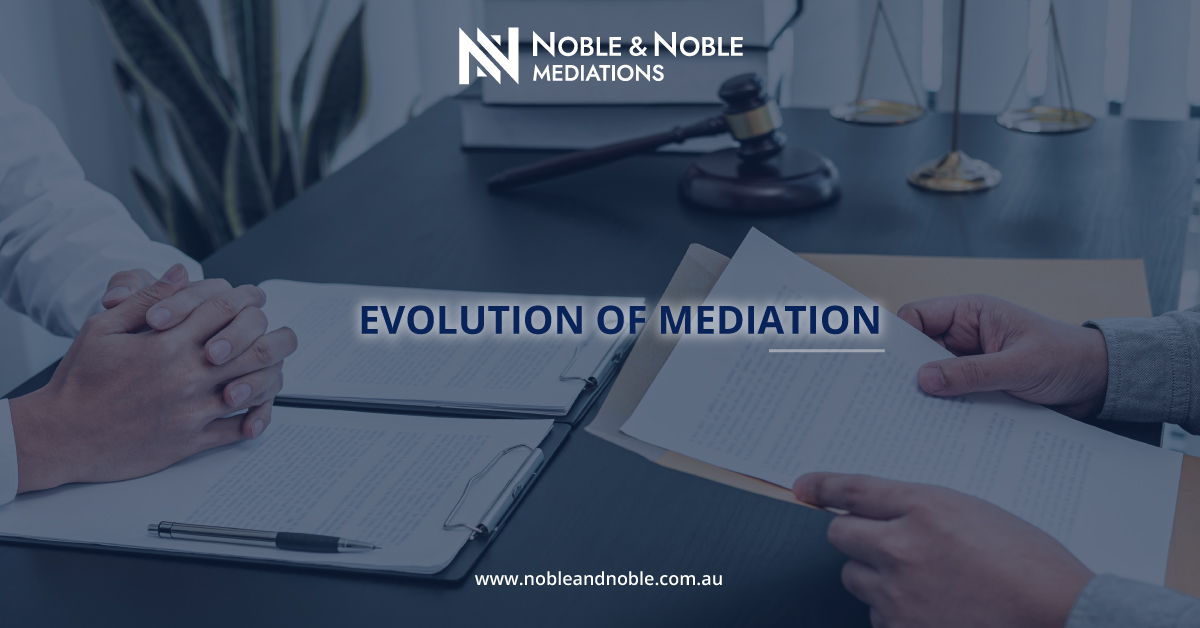
Evolution of Mediation
What are Mediations?
 Mediation has grown rapidly across the world since the 1960s. Australia has become a global leader in mediation law and practice, readily embracing new technology and new ideas. Mediation is a process in which parties, with the assistance of a mediator, identify the issues in dispute and endeavour to reach an agreement.
Mediation has grown rapidly across the world since the 1960s. Australia has become a global leader in mediation law and practice, readily embracing new technology and new ideas. Mediation is a process in which parties, with the assistance of a mediator, identify the issues in dispute and endeavour to reach an agreement.
The Noble Park Centre was one of the first mediation programs funded by the Commonwealth Government. In 1989, the Centre recorded that 72 mediations were conducted. At this stage, professional standards, guidelines and accredited regimes were yet to be introduced.
Court-based mediation was introduced by the Victorian County Court in 1983. The Federal Court of Australia followed suit and introduced a mediation program for alternative dispute resolution in 1987. In 1991, the Federal Court of Australia Act 1976 was amended to allow the Court, with consent of the parties, to refer the proceeding to a mediator.
As summarised by Barrister David Paratz, mediation was a new philosophy focusing on cooperative problem-solving in place of the old combat model where parties were pitted against each other. Practitioners had little choice but to readily embrace the rise of mediation otherwise they would be left behind.
Why is Mediation Preferred?
Mediation is now the preferred, cheaper and quicker alternative to litigation in Australia. The majority of Australia laws facilitate, even mandate mediation prior to commencing court proceedings. In Family Law, mediation is a mandatory pre-action procedure for parenting matters pursuant to section 60I of the Family Law Act 1975. There are exemptions to this requirement based on urgency, family violence and/or child abuse. Outside of the Court, many private organisations and institutions offer mediation services for any kind of dispute.
As one of the most litigious societies in the world, mediators are continuously exploring new and creative styles of mediation. Some examples include:
- Transformative mediation – the mediator focuses on empowering parties to resolve their conflict and encouraging them to recognise each other’s needs and interests. This is an ambitious style of mediation, aiming to transfer the relationship of the parties through the process of acquiring the skills they need to make constructive change.
- Narrative mediation – this is a modern form of mediation where the primary focus of the mediator is on fixing the relationship between parties and then resolving the dispute following that.
- Online mediation – this form of mediation utilises online or web-based technologies to assist in the resolution of disputes. The process usually involves a third party whose role is to adopt facilitative, advisory or determinative approaches. However, the third party role is often assumed by online computer-based software or other artificial intelligence that do not involve a ‘human’ practitioner. While Australia is still warming to the idea of online mediation, mediators are ready to support and foster the development of this new technology.
If you are ready to participate in mediation and reach a timely and fair outcome with your ex-partner, please contact the team at James Noble Law today for a free, no-obligation 20 minute consultation.
Need Help ?
Contact Brisbane Mediators now. Or choose a package to suit your requirements, “Noble and Noble Mediations” offer convenient set Price Packages at half day or full day rates, which cover full cost of mediation and amenities on the day. Simple.
Find Best Family Mediators in Brisbane on Google Maps near you now.
Learn more about other resource




